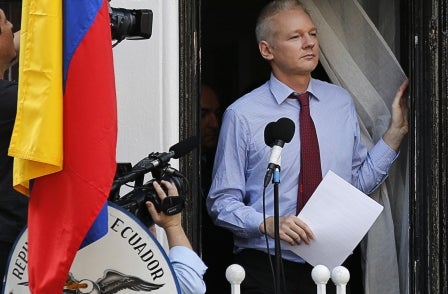
Former Guardian collaborater Julian Assange has penned an excoriating review of Guardian book, The Snowden Files, for Newsweek.
In it he complains that none of the $700,000 director Oliver Stone paid for the film rights to the book has been contributed to Edward Snowden’s legal defence.
And he says that the book, by Guardian journalist Luke Harding, is not the “inside story” but instead “largely pieced together from more original work by James Risen, Glenn Greenwald, Laura Poitras, Peter Maas, Janet Reitman, writers from the South China Morning Post and others”.
He writes: “Where the book is accurate, it is derivative. And where it is not derivative, it is not accurate.
“In the chapter on Snowden's exit from Hong Kong, I discover that I had been ‘frantically trying to make contact with Edward Snowden’ and that I had ‘barged [my] way into [his] drama’.
“I was present at these events (Harding was not), and it was Edward Snowden who contacted me for help, not the other way around.”
Among many criticisms made by Assange of The Guardian is that it “caved to government pressure—something it continues to do”.
He writes: “Originally, the paper wasn't even going to publish the Snowden leaks—Glenn Greenwald had to force its hand.
“On request of the government, the paper later voluntarily destroyed its copies of the Snowden documents—and the computers they were saved on—in the basement of its London offices, under the supervision of GCHQ.”
While Guardian journalists have widely complained about lack of follow-up of the Snowden story in the UK, Assange notes “it is certain that more papers would have run Snowden stories in the UK if The Guardian had shared its material with the rest of the London press. Who wants to recycle someone else's scoops?”
The Guardian did opt to share the Snowden files with the New York Times.
He says the book's characterisation of him as Manichean (one who has a binary view of the world in terms of good and evil) is evidence of The Guardian's “longstanding, cartoon-like vendetta against me”.
He writes: “How can one reconcile the duty to a source with the mad rush to be the first to market with a lucrative, self-glorifying, unauthorized biography? For all the risks he took, Snowden deserves better than this.”
Assange’s piece is the biggest take-down of The Guardian by someone who has formerly worked with the paper since Michael Wolff’s acerbic feature for GQ last year.
In it, he claimed The Guardian has lost its objectivity over reporting of Snowden:
News outlets want to break big stories but at the same time not be overwhelmed by them – a certain detachment is well advised. It is an artful line. But the Guardian essentially went into the Edward Snowden business – and continues in it…
Email pged@pressgazette.co.uk to point out mistakes, provide story tips or send in a letter for publication on our "Letters Page" blog
